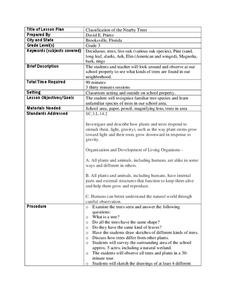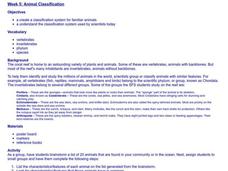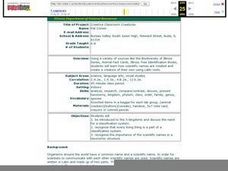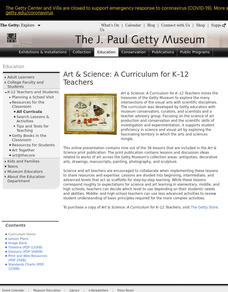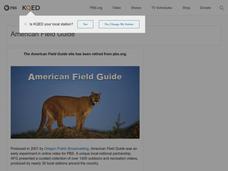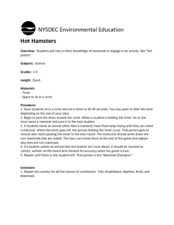Curated OER
Classification of the Nearby Trees
Third graders practice using classification techniques to identify local trees. In this plant life instructional activity, 3rd graders discuss how trees differ from other plants and what characteristics are unique to trees alone....
Curated OER
Classification of Cerealites
Students create a dichotomous key. In this categorizing lesson, students create a dichotomous key for different types of cereal. Students classify the cereal into groups such as flakes and cereal with holes. Students discuss their...
Curated OER
Classification 2
Students discuss what makes a living thing (for example, cellular respiration) and collect a selection of living things from outside. They divide their organisms into plants and animals and create a key for the divisions.
Curated OER
Animal Classification
Students recognize the six groups of animals (Mammals, fish, birds, reptiles, amphibians and arthropods) and their characteristics. In this animal characteristics lesson plan, students sort animals by their traits. Students...
Curated OER
Classification
Students complete an animal classification activity. In this classification lesson, students learn about the seven classification levels of animals. Students are given several animal sheets in which they separate 12...
Curated OER
Animal Classification
Young scholars list characteristics and features of animals found in their community. They then group the animals according to how they are similar and different and create names for each group. They then create a chart of their...
Curated OER
Classification Schemes
Students place organisms into the correct classification and justify their reasoning. They must include all objects and have a reason for their decisions.
Curated OER
Classify UT Plants and Animals
Students practice using 2 different plant classification keys to identify species. They make choices between the similarities and differences between their object and the classification scheme.
Curated OER
Living On Earth
Students discover the many different animals within various habitats and discover how each individual species interacts with its particular environment. Through charting different animals and their distinct habitat and matching animals...
Curated OER
Creative Classroom Creatures
Students are introduced to the five kingdoms and discover why there is a need for a classification system. Using the internet, they examine how scientific names are created and practice putting animals into their correct classification....
Curated OER
Animal Classification
Second graders identify characteristics of and group animals by the five categories of vertebrates.
Curated OER
What Animals Need to Live
Fourth graders read "Habitat: What Animals Need to Live" then create a Venn diagram for herbivore, omnivore, and carnivore. In this animal survival lesson, 4th graders determine where different animals need to live depending on what they...
Curated OER
Classifying Commercial Marine Species
Students investigate taxonomy. They explore some of the commercial marine species caught in Magdalena Bay and develop a classification system for presented animals.
Captain Planet Foundation
Which Plant Is Which?
Learn about dichotomous keys, plant identification, and how to care for the planet with a lesson plan that includes several hands-on and innovative activities. Kids go on a plant scavenger hunt and classify the plants that they find...
Curated OER
Classifying Vertebrates
Second graders study animal characteristics and classification. For this animal characteristics and classifications lesson, 2nd graders determine how to classify vertebrates which include mammals, reptiles, amphibians, birds, and fish....
Curated OER
Clearly Classified
Young scholars review the classification system for living organisms and apply it the classification of insects and flowers in the still life by Ambrosius Bosschaert. They create a chart classifying the animals and plants in the painting...
Curated OER
The Kingdoms
Students review the various categories in taxonomy. In groups, they identify the characteristics of each kingdom and compare and contrast them. They define the terms binomial nomenclature and morphology. To end the activity, they...
Curated OER
Invertebrates
Students examine invertebrates. In this animal classification lesson, students discuss invertebrates and bilateral symmetry. They discuss the importance of horse shoe crabs in medical science.
Curated OER
Flowers and Plants
Students are assigned to bring five flowers. They explore flowers to distinguish different physical features of flowers. They compare and contrast different flowers to determine what features they have in common. Students develop an...
Curated OER
Hot Hamsters
Using this quick activity, you can have your class review what they have learned about mammals. Learners sit in a circle, and take turns naming a mammal. This activity could be enriched by having learners go to their desks, identify a...
Curated OER
Animal Classification
Young scholars classify animals. In this animal classification lesson, students identify characteristics from each of the 5 categories of vertebrates. Young scholars group animals by categories.
Curated OER
Classification of Materials
Students classify photographs into a two-way classification system. They practice with pictures of people who are young and old, male and female, then they use pictures of animals to create their own two-way classification system.
Curated OER
Animal Classifications
Third graders work in small groups to investigate how to sort a variety of items into groups and subgroups. They work on a class chart based on the activity which show how the items are classified based on commonalities. Upon completion...
Curated OER
Animals
Students explore biology by participating in a science vocabulary activity. In this animal species lesson, students define a list of animal vocabulary terms as well as practice using them in sentences with the appropriate adjectives and...
